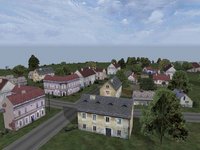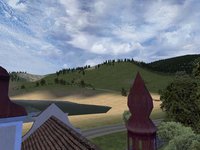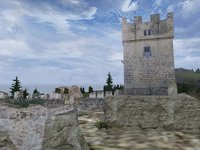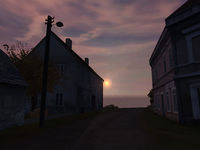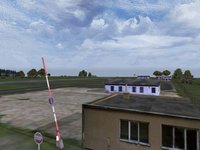Everon
Everon is the easternmost island in the Malden group. It was once a Soviet outpost in the mid 1900s before being abandoned. Many people from Everon can trace their ancestry to Nogova and/or Russia. Many came to Everon in the mid 1900s to escape the socialist regime on Nogova. Everon is mostly covered in evergreens but also has a large number of different types of trees. There is a laid back, sedentiary lifestyle on Everon, relying on agriculture and farming for self sustenance of the communities. There is no established government, due mostly to the low population of the island.
Overview
Villages
There are a few large villages on Everon. The most central of these is Montignac. Lamentin is a large town and is located far west, and is known for it's breathtaking sunsets. Finally there is Saint Pierre in the valley to the south. The rest of the villages are fairly small.
The buildings are very different from Nogova. They look older and less maintained (doors lying on floor, bad roofs), and still display the residual traces of a socialistic lifestyle from when there was a Soviet presence (mid 1900s), but there are some nice churches on Everon, built in the late 1800s. The island has one large castle ruin which is used by the Everon Resistance Group as HQ in the Cold War Crisis campaign. It's located above Saint Pierre on top of the mountain to the south.
The ruin consists of a gate, tower, one destroyed tower and some other remains of walls scattered around. The castle makes an ideal defensive position because the mountain it is situated on is very steep, making attacking with tanks infeasible and lending the defenders a considerable advantage.
Everon also has a small airfield to the north with some military buildings and a fuel station. The military buildings are remnants of the Soviet occupation of the island in the mid 1900s.
Terrain & Foliage
Everon is mostly an evergreen island but has a range of different trees as well, including Oaks, Birches, Chestnuts, and Beeches. All dense forests are made up of pines. In the mountains there are only spruces and some rocks.
The terrain is rather flat to quite hilly in most parts of Everon. The south-eastern part however is more mountainous and has a valley.
Freedom & Independence Alliance (FIA) and the Everon Freedom Alliance
Following the defeat of the invading Soviet forces on Nogova in 1982, some members of the resistance army travelled to Everon to put in place safeguards should a similar fate befall that island. Weapons, training and other resources were left in the hands of a very select few on Everon, including the future resistance leader. The reasons for this migration of ideas can only be theorised, although many from Nogova have familial, geneological ties with those on Everon. This is why the FIA symbol was seen used by the Everon Freedom Alliance during the occupation of Everon in 1985.
Real Everon
Everon's landscape is based on the Croatian island of Krk.
